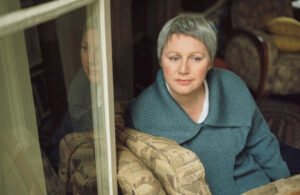33. Elizabeth Fraser
The Voice of Heaven
Elizabeth Fraser is one of the most singular and transcendent voices ever to emerge from Britain’s musical landscape. Best known as the vocalist for the Cocteau Twins, she has been described as ethereal, otherworldly, and incomparable — but no description ever quite captures the magic of hearing her sing. Born in Grangemouth, Scotland, in 1963, Fraser’s journey from a shy, working-class upbringing to becoming one of the most revered singers of her generation is nothing short of remarkable.
Joining the Cocteau Twins in 1981, Fraser helped define a sound that would ripple across decades of alternative music. Alongside Robin Guthrie and Will Heggie (later Simon Raymonde), she forged a style that fused shimmering guitars with her extraordinary voice. What set Fraser apart was not just the beauty of her tone, but the way she used language itself. Often eschewing conventional lyrics for glossolalia, fractured syllables, or deeply abstract phrases, she created songs that bypassed logic and spoke directly to emotion. To hear her sing was to feel something profound, even if the words themselves were elusive.
Albums like Treasure (1984), Blue Bell Knoll (1988), and Heaven or Las Vegas (1990) showcased Fraser at her peak: soaring, keening, whispering, and wailing in ways that felt untethered to earthly limits. Critics and fans alike struggled to describe her gift, settling for metaphors of angels, oceans, and dreams. Countless artists — from Björk to Florence Welch — have cited her as an inspiration, but in truth, Elizabeth Fraser remains utterly inimitable.
Beyond the Cocteau Twins, Fraser’s collaborations further highlight her brilliance. Her haunting performance on Massive Attack’s Teardrop (1998) is one of the most iconic vocal recordings of the era — a song so powerful and emotive that it has lived on in popular culture ever since. She has also worked with artists such as Peter Gabriel, This Mortal Coil, and more recently appeared with Damon Reece, creating music that continues to captivate.
Despite her legendary status, Fraser has always been a deeply private and humble figure. Shunning the trappings of stardom, she has allowed her voice to speak louder than any celebrity persona. This authenticity has only deepened the reverence in which she is held; fans see her as not just an artist, but as a kind of channel for beauty and emotion.
Elizabeth Fraser’s career is a reminder that music at its best transcends boundaries. She showed that words are not always necessary to communicate feeling, and that the human voice itself is an instrument of infinite possibility. Her influence continues to ripple through genres — dream pop, shoegaze, trip-hop, and beyond — but her gift remains unique.
For many, she is quite simply “the voice of heaven.” Elizabeth Fraser’s artistry stands as a beacon of beauty, proof that sound alone can move the soul, stir the heart, and remind us of the wonder in being human.



